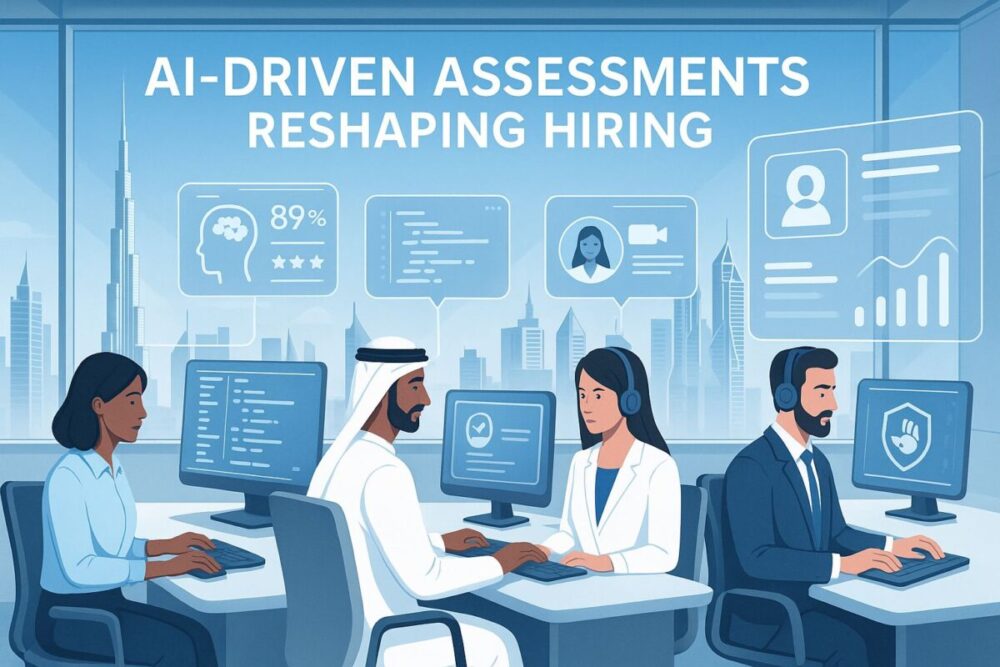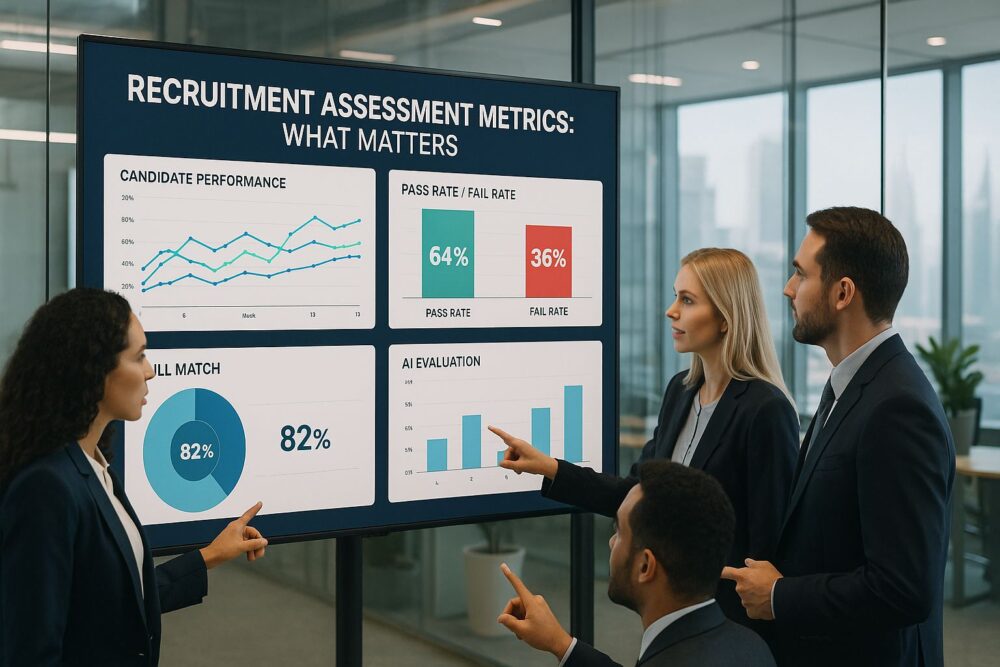UAE HR Training: The human resources landscape across the United Arab Emirates is experiencing its most significant transformation in decades. While HR professionals have traditionally built their expertise around CV screening and conventional interviewing, a fundamental shift toward assessment-based hiring is reshaping the entire recruitment ecosystem.
This isn’t a gradual evolution it’s a recruitment revolution happening right now. Current data reveals that 76% of employers are incorporating skills-based assessments into their hiring processes, with 71% reporting these tools provide more accurate predictions of job success than traditional CVs.
UAE HR Training: For HR professionals operating in the UAE’s dynamic, multicultural business environment, understanding and implementing assessment-based hiring has become essential for maintaining competitive advantage in talent acquisition.
UAE HR Training: The UAE’s Unique HR Challenges Drive Assessment Adoption
UAE HR Training: The Emirates present distinct human resources challenges that make skills-first hiring particularly valuable for local organizations.
Multicultural Workforce Complexity
With professionals from over 200 nationalities working across the UAE, traditional CV screening often fails to assess the soft skills crucial for cross-cultural collaboration. Personality assessments provide objective insights into cultural intelligence, adaptability, and communication styles that CVs cannot effectively convey.
Cultural fit assessment becomes particularly critical in UAE workplaces where team dynamics can make or break project success. Assessment tools help identify candidates who will thrive in diverse, collaborative environments regardless of their cultural background.
Skills vs. Credentials Mismatch
The UAE’s rapidly evolving economy, driven by Vision 2030 initiatives and economic diversification, often requires capabilities that weren’t emphasized in traditional educational systems. Skills assessments allow HR teams to identify candidates with the agility and problem-solving abilities needed for innovation-focused roles.
Real-world example: A Dubai-based technology company discovered that bootcamp graduates consistently outperformed computer science degree holders in practical coding assessments, leading to a complete overhaul of their technical hiring criteria.
Emiratization and Local Talent Development
UAE nationals entering the workforce benefit significantly from skills-first hiring approaches that evaluate potential rather than just experience. Assessment tools help identify Emirati candidates with strong leadership potential and cultural intelligence who might be overlooked through traditional credential screening.
Strategic advantage: Organizations using assessment-based hiring report 55% success in eliminating degree requirements, opening more opportunities for diverse local talent pools.
Assessment Types Transforming UAE Recruitment

UAE HR Training: Modern HR departments across the Emirates are implementing comprehensive assessment strategies that go far beyond traditional interviewing.
Personality and Behavioral Assessments
Big Five Personality Tests: Evaluate candidates across five core dimensions openness, conscientiousness, extraversion, agreeableness, and neuroticism providing insights into work style and team fit.
Myers-Briggs Type Indicator (MBTI): Popular for team building and cultural fit assessment, though primarily designed for development rather than hiring decisions.
Workplace Behavior Assessments: Custom tools designed specifically for UAE business environments, evaluating traits like stress management under pressure and cross-cultural communication effectiveness.
Cognitive Ability Evaluations
Logical Reasoning Tests: Measure problem-solving capability and analytical thinking essential for the UAE’s knowledge-based economy.
Numerical Reasoning Assessments: Evaluate mathematical and statistical thinking crucial for finance, engineering, and data analysis roles prevalent in Dubai and Abu Dhabi.
Verbal Comprehension Tests: Assess communication and language processing abilities important for client-facing roles in the UAE’s service-oriented economy.
Skills Simulation and Practical Assessments
Job-Specific Simulations: Candidates complete tasks identical to actual job responsibilities, providing direct evidence of capability.
Situational Judgment Tests: Present workplace scenarios common in UAE business environments, evaluating decision-making processes and value alignment.
Cultural Intelligence Assessments: Specialized tools measuring ability to work effectively across the cultural diversity typical of UAE organizations.
Implementation Strategies for UAE HR Teams
UAE HR Training: Successful assessment integration requires strategic planning and cultural sensitivity appropriate for the UAE business environment.
Assessment Program Design
Multi-Measure Approach: Combine personality, cognitive, and skills assessments for comprehensive candidate evaluation. Research shows 91% of employers using multi-measure testing report making quality hires.
Stage-Appropriate Integration: Implement assessments early in the hiring funnel to maximize efficiency, with 36% of successful companies using skills tests before CV screening.
Role-Specific Customization: Different positions require different assessment combinations. Senior leadership roles emphasize personality and cultural intelligence, while technical positions focus on cognitive ability and skills simulations.
Cultural Adaptation: Ensure assessment tools account for UAE business culture and the diverse candidate pool typical of Emirates-based organizations.
Technology Infrastructure Requirements
Cloud-Based Platforms: Scalable solutions that handle high-volume assessment while maintaining security standards required for UAE business operations.
Mobile Optimization: Accommodate candidates’ preference for smartphone-based applications, reflecting the UAE’s high mobile adoption rates.
Integration Capabilities: Seamless connection with existing HR information systems and applicant tracking software used across UAE organizations.
Multi-Language Support: Essential for serving the UAE’s diverse candidate pool, with Arabic and English being minimum requirements.
Legal and Compliance Considerations
UAE Labor Law Alignment: Ensure assessment tools comply with local employment regulations and anti-discrimination requirements.
Data Protection Standards: Implement appropriate cybersecurity measures consistent with UAE data protection regulations and candidate privacy expectations.
Equal Opportunity Compliance: Verify that assessment tools don’t inadvertently discriminate based on nationality, gender, or other protected characteristics.
Documentation Requirements: Maintain proper records for regulatory compliance and potential employment disputes.
Training HR Teams for Assessment Success
UAE HR Training: Effective assessment-based hiring requires comprehensive training for HR professionals to maximize program success and avoid common implementation pitfalls.
Core Competency Development
Assessment Interpretation Skills: Training HR teams to accurately interpret personality, cognitive, and skills assessment results for informed hiring decisions.
Interview Integration Techniques: Using assessment results to develop targeted interview questions that explore candidate capabilities more deeply.
Bias Recognition and Mitigation: Understanding how unconscious bias can affect assessment interpretation and decision-making processes.
Legal and Ethical Assessment Use: Ensuring proper, compliant use of assessment tools while maintaining candidate rights and organizational protection.
Practical Implementation Training
Platform Proficiency: Hands-on training with assessment software and interpretation dashboards used by the organization.
Candidate Communication: Developing skills for explaining assessment processes to candidates and managing their expectations throughout the evaluation.
Results Analysis: Learning to combine assessment data with other hiring criteria for holistic candidate evaluation.
Continuous Improvement: Using assessment outcomes and hire success data to refine and optimize the assessment program over time.
Cultural Intelligence for UAE Context
Cross-Cultural Assessment Interpretation: Understanding how cultural background might influence assessment responses without compromising evaluation validity.
Local Business Culture Integration: Incorporating UAE business values and expectations into assessment result interpretation.
Emiratization Strategy Alignment: Using assessments to support local talent development initiatives while maintaining hiring quality.
Regional Market Awareness: Understanding assessment trends and best practices across GCC countries for competitive positioning.
Measuring Assessment Program Success

UAE HR Training: UAE HR teams need robust metrics to demonstrate assessment program value and guide continuous improvement efforts.
Key Performance Indicators
Hire Quality Improvement: Comparing performance ratings and retention rates between assessment-based and traditional hires.
Time-to-Hire Reduction: Measuring efficiency gains from streamlined candidate screening and evaluation processes.
Cost-per-Hire Optimization: Calculating total recruitment costs including assessment tools versus traditional hiring method expenses.
Candidate Experience Scores: Monitoring feedback from candidates about assessment processes and overall application experience.
Long-Term Success Metrics
Employee Retention Rates: Tracking whether assessment-based hires demonstrate longer tenure and higher job satisfaction.
Performance Correlation: Analyzing relationships between assessment scores and actual job performance over time.
Cultural Fit Indicators: Measuring team cohesion and collaboration effectiveness in groups hired using personality assessments.
Diversity and Inclusion Impact: Evaluating whether skills-first hiring improves workforce diversity and reduces credential bias.
Advanced Assessment Strategies
UAE HR Training: Leading UAE organizations are implementing sophisticated assessment approaches that go beyond basic personality and skills testing.
Predictive Analytics Integration
Machine Learning Enhancement: Using AI to analyze assessment patterns and predict candidate success more accurately.
Performance Correlation Modeling: Developing organization-specific algorithms that connect assessment results with actual job performance.
Cultural Fit Prediction: Advanced analytics that evaluate personality assessment results against successful employee profiles within specific UAE team contexts.
Continuous Assessment Programs
Employee Development Integration: Using similar assessment tools for ongoing employee development and internal mobility decisions.
Skills Gap Identification: Regular assessment of current workforce capabilities to identify training needs and recruitment priorities.
Succession Planning Support: Incorporating assessment data into leadership development and succession planning strategies.
Industry-Specific Assessment Applications
UAE HR Training: Different sectors across the UAE are developing specialized assessment approaches tailored to their unique requirements and challenges.
Financial Services and Banking
UAE’s position as a regional financial hub requires professionals who can navigate complex regulations while maintaining cultural sensitivity with diverse client bases.
Risk Assessment Orientation: Personality tests identifying candidates with strong ethical reasoning and attention to detail crucial for compliance roles.
Client Relationship Skills: Assessment tools evaluating empathy, communication effectiveness, and cultural intelligence for customer-facing positions.
Stress Management Capabilities: Evaluating resilience and performance under pressure essential for trading, investment, and high-stakes financial roles.
Technology and Innovation Sectors
Dubai’s Smart City initiatives and Abu Dhabi’s technology investments create demand for innovative problem-solvers who can adapt to emerging technologies.
Logical Reasoning Excellence: Cognitive assessments measuring analytical thinking and pattern recognition essential for development and engineering roles.
Learning Agility Evaluation: Tests measuring ability to quickly master new technologies and methodologies in rapidly evolving tech environments.
Collaborative Innovation Skills: Personality assessments identifying candidates who can contribute effectively to cross-functional innovation teams.
Hospitality and Tourism
With tourism being fundamental to the UAE economy, hospitality employers prioritize personality traits that ensure exceptional guest experiences.
Service Orientation Assessment: Personality tests identifying natural warmth, patience, and problem-solving orientation essential for luxury hospitality.
Cultural Intelligence Evaluation: Specialized assessments measuring ability to serve diverse international clientele effectively and sensitively.
Stress Management Under Pressure: Tools evaluating performance maintenance during high-volume periods and challenging guest situations.
Future Trends in UAE Assessment-Based Hiring
UAE HR Training: Understanding emerging trends helps HR professionals prepare for the continued evolution of assessment-based recruitment.
Technology Integration Advances
Virtual Reality Assessments: Immersive simulations that evaluate candidate performance in realistic work environments.
Real-Time Behavioral Analysis: AI-powered tools that analyze candidate responses and behavior patterns during assessment completion.
Gamification Elements: Assessment tools incorporating game-like elements to improve candidate engagement while gathering performance data.
Regulatory and Standards Development
GCC Assessment Standards: Regional coordination on assessment best practices and legal compliance requirements.
Professional Certification Programs: Formal credentials for HR professionals specializing in assessment-based hiring methodologies.
Industry-Specific Guidelines: Sector-tailored assessment standards addressing unique requirements of different UAE industries.
Strategic Recommendations for UAE HR Leaders
UAE HR Training: Success in the assessment-driven recruitment landscape requires proactive planning and systematic implementation.
Immediate Action Steps
Assessment Audit: Evaluate current hiring practices and identify opportunities for assessment integration.
Team Training Investment: Provide comprehensive assessment interpretation and implementation UAE HR training staff.
Technology Platform Selection: Choose assessment tools that align with organizational needs, candidate demographics, and UAE regulatory requirements.
Pilot Program Implementation: Start with limited assessment integration to test effectiveness and refine processes before full deployment.
Long-Term Strategic Planning
UAE HR Training: Organizational Culture Alignment: Ensure assessment criteria reflect and support desired organizational culture and values.
Continuous Improvement Systems: Establish regular review and optimization processes for assessment program effectiveness.
Industry Leadership Positioning: Use assessment expertise to attract top talent and establish reputation as an innovative employer.
Regional Expansion Planning: Develop assessment capabilities that support potential expansion across GCC markets.
UAE HR Training: The UAE’s human resources landscape is transforming rapidly, driven by economic diversification goals and the need for more effective talent identification methods. HR professionals who master assessment-based hiring will position themselves and their organizations for success in the Emirates’ competitive business environment.
The evidence overwhelmingly supports assessment-based hiring as more effective than traditional methods. The question for UAE HR training leaders isn’t whether to adopt these approaches, but how quickly they can implement them effectively while maintaining the cultural sensitivity and legal compliance essential for success in the Emirates.
UAE HR Training: The future of UAE recruitment is being shaped today by the decisions HR professionals make about assessment integration and team capability development. Those who act decisively will lead the transformation, while those who hesitate risk falling behind in the region’s intensely competitive talent market.

